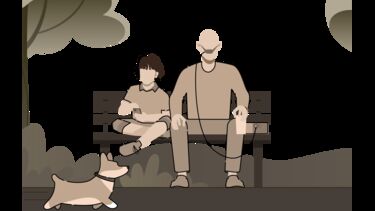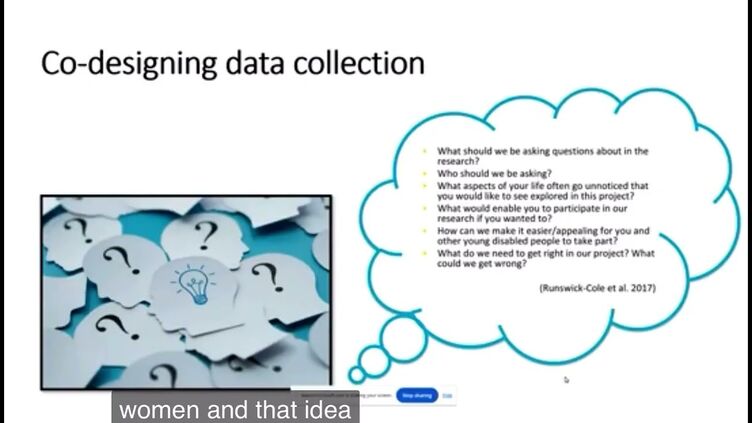Outputs
On this page you will find our publications, films, and resources, all of which are open access.

Co-producing research with disabled and chronically ill people, Dr Julie Ellis and Dr Kirsty Liddiard, School of Education and iHuman, University of 91ų▒▓ź, a talk for the South Yorkshire Children and Young People's Health Research Group (SCYPHeR), March 2025
Co-production is a collaborative approach that values experiential knowledge and lived experience. It fundamentally challenges the hierarchical ways in which most knowledge is produced and instead puts ŌĆśprinciples of empowerment into practice, working ŌĆ£withŌĆØ communities and offering communities greater control over the research processŌĆÖ (Durose et al. 2012: 2). In practice this is not easy, and often researchers who commit to the principles of co-production - centring equity, accessibility and reciprocity in their work - have to ŌĆśfeelŌĆÖ their way through the research process and navigate an external research environment wary of the unknowing and uncertainty which is an inherent (and productive) part of co-produced research. To support others engaging in or aspiring to undertake co-production, our talk will offer reflections from our own experiences of working on two co-produced, qualitative research projects. (ESRC) explored the lives, hopes, desires and contributions of disabled children and young people with life-limiting and life-threatening impairments, and the second, is a current study, Cripping Breath (Wellcome Trust) which centres the lived experiences of people who have had their lives saved and sustained by ventilatory medical technologies. We will discuss practical aspects of co-leading research with communities of disabled and chronically ill people (such as collaborative data analysis and writing for publication), and acknowledge the important ways in which working in this way disrupts our ŌĆścomfortableŌĆÖ academic ways of understanding (and engaging in) knowledge production.
Ellis, J., Atkinson, L., Glover, S., Kettle, J., Joseph, G., Hale, J., Jones, A., Coles, M., Bligh, L., Bridgens, R., O'Kane, C., Negus, J., Ali, H., Thompson, C., Waters, S., Coats, C., Gibson, B., Weiner, K., Lawson, R., and Liddiard, K. (2025) 'Cripping Inquiry: Breathing life into co-produced disability methodologies', Special Issue: Frontiers in Sociology Novel Sociological Methods and Practices of Engagement across Disability Communities, Vol 10:
Introduction: Our contributions within this article emerge from our experiences of co-leading a new Wellcome Discovery Award funded project, Cripping Breath: Towards a New Cultural Politics of Respiration. As a diverse team of clinicians, artists, academics and others with lived and embodied experience of disability, chronic illness, and neurodivergence, we are broadly exploring breathing and ventilation (e.g. forms of medical technology that support respiration) through arts-informed, archival, narrative and ethnographic research approaches.
Methods: Cripping Breath aims to forge new understandings of respiration from crip perspectives (see McRuer 2006), which unapologetically centre disability as a valued human experience. In this article, we unpack the meanings, politics and practices of crip perspectives and methodologies - forms of knowledge production that emerge from lived and embodied experiences of disability and chronic illness - and consider their contributions to our project so far. We think through crip time (Kafer 2013), Slow scholarship (Mountz et al. 2015) and (seemingly) radical things like rest and recuperation (Atkinson et al. 2024), and grief and loss (Borgstrom and Ellis 2021) within the research process.
Results: We share the importance of embracing flexibility, adaptability and radical care as routine across our team, because we all bring various types of impairment, embodiment, chronic illness (see Piepzna-Samarasinha 2018), and caring
responsibilities.
Discussion: We question the meanings of these forms of welcoming in disability, impairment and difference as ways to develop radical and crip cultures of co-produced and innovative disability research methodologies, and conclude by calling for a more inclusive sociology.
Atkinson, L., Hale, J. and Liddiard, K. (2024) 'Rethinking Crip time and embodiment in research', The Polyphony. Online.
'Cripping Breath: Towards a new cultural politics of respirationŌĆÖ is a five-year co-produced project that centres the lives of people who use ventilatory medical technologies (Wellcome Discovery Award, 226472/Z/22/Z). As a diverse team of clinicians, artists, academics and others with lived and embodied experience of disability, chronic illness, and neurodivergence, we are broadly exploring breathing and ventilation (e.g. forms of medical technology that support respiration) through arts-informed, archival, narrative and ethnographic research approaches. Cripping Breath aims to forge new understandings of respiration from Crip perspectives (see McRuer 2006), which unapologetically centre disability as a valued human experience. We aim to challenge breathing as an autonomous and natural function that is framed as central to our humanness and ability to live, the absence of which brings us close to death (see Solomon 2020). In this essay, members of the project team draw upon personal narratives and embodied experiences of respiratory failure and neurodivergence to think through crip time. Crip time (Kafer 2013: 27) refers to the relationships between disability and time.
Liddiard, K., Atkinson, L., Evans, K., Gibson, B., Goodley, D., Hale, J., Lawson, R., Runswick-Cole, K., Spurr, R., Vogelmann, E., Watts, L., Weiner, K., and Whitney-Mitchell, S. (2024) 'ŌĆ£No-oneŌĆÖs contribution is more valid than anotherŌĆÖsŌĆØ: Committing to inclusive democratic methodologies', Research in Education: Democratic Methodologies in Education Research (Special Issue).
In this article, we explore the power and potential of democratic research methodologies in and beyond Critical Disability Studies research contexts. We centre two funded, co-produced, participatory and arts-informed projects that have been co-designed and co-led with disabled young people and people living with chronic (respiratory) illness. We critically explore some key processes, which we suggest can mitigate forms of disablism and ableism inherent to research processes which traditionally make them undemocratic spaces of inequity. Our article offers original analyses into the very notion of democratic research which have significant applications; driven as they are by the presence of disability. These include (i) Crip time - the recognition of (disabled) peopleŌĆÖs need for ŌĆśflex timeŌĆÖ (Kafer 2013); (ii) virtual methods and intimacies as routes to equity in research leadership; and (iii) flexible and slow/er research approaches. We also draw upon the ways in which the Covid-19 global pandemic has reshaped methodologies and approaches to inquiry. We advocate that, as research communities, we must come together to keep hold of these new inclusive and hybridised ways of relating and engaging in what are problematically framed as ŌĆ£post-CovidŌĆØ times. We conclude by emphasising the importance of always committing to disrupting power dynamics through centring flexibility, accessibility and inclusivity across our inquiry with marginalised others.

